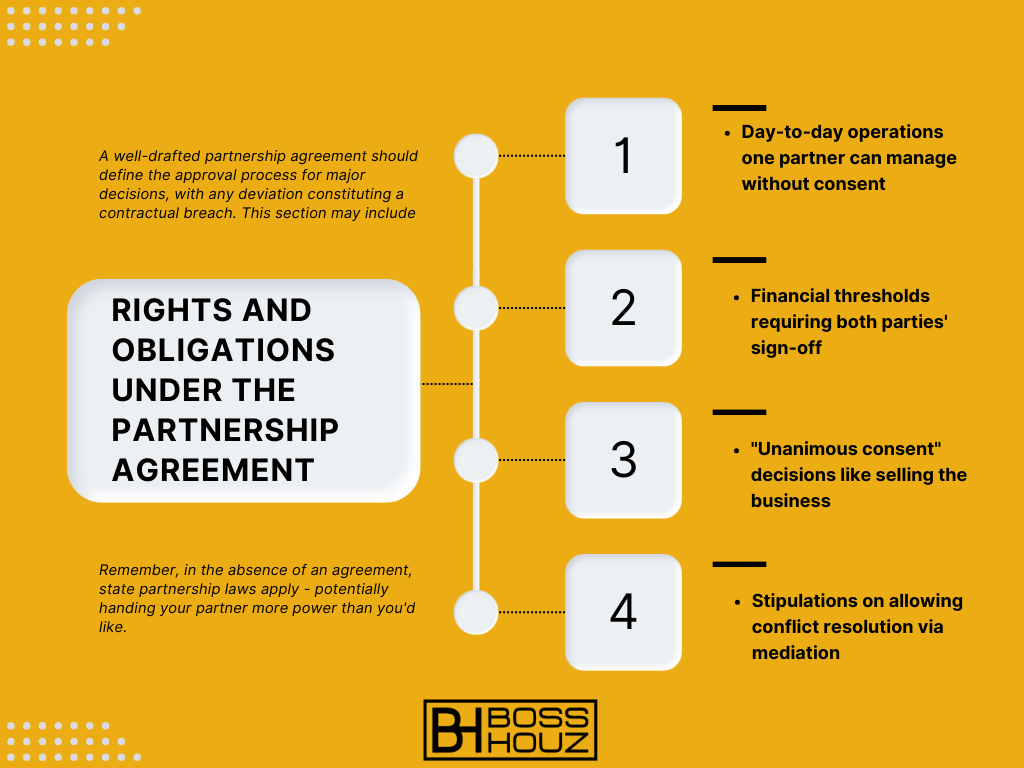It’s the entrepreneurial dream – going into business with someone you trust implicitly, two visionaries combining their talents to build something amazing together. But what happens when that harmonious partnership hits a sour note and your co-founder starts calling all the shots?
That broken record of one partner excluding the other from key decisions is a harsh awakening that can leave you feeling powerless in your own company. The once bright-eyed optimism fueling your collective endeavor turns into disagreements, breakdowns in communication, and perhaps even outright conflict.
Before you completely lose faith in your business bestie, take a deep breath. All is not lost – we’re digging into this very scenario to expose the roots of the issue and provide you with battle-tested solutions for restoring balance to your partnership.
Key Takeaways:
- Partners should have equal say in major decisions per the partnership agreement
- Unilateral decisions can damage trust, finances, and business success
- Address issues early through communication, mediation if needed
- Update operating agreements to clarify decision-making processes
- Dissolving the partnership may be a last resort if conflicts persist
Table of Contents
Understanding the Roots of Partnership Disputes
Even the most tight-knit business partnerships aren’t immune to internal strain. Disagreements over the company’s direction, financial concerns, or a simple case of clashing egos can fester into an unhealthy power imbalance.
Soon, one partner may start thinking their vision reigns supreme, making major calls without so much as a whisper to their counterpart. This unilateral decision-making is a textbook violation of the equal say each partner should have according to that binding contract you shook hands over – the partnership agreement.
The impact? That violation of trust can snowball into much bigger problems compromising the very foundation of your business relationship. Battles over decisions already made without your input. Confusion among employees receiving mixed signals from leadership. Potential legal risks arising from calls made without all parties’ informed consent.
In short, a once well-oiled machine becomes disjointed, with one partner steaming ahead while the other gets left choking on their dust.
Signs Your Partner Is Making Decisions Without You
But how can you be sure your partner is truly ghosting you on key choices? Call it a hunch, but certain shady behaviors tend to raise red flags:
- You’re caught off-guard by major business developments or new hires when you should’ve been briefed.
- Financial documents reveal expenditures or investments you knew nothing about.
- Employees start going around you to run ideas by your partner instead.
- Important client or vendor meetings somehow never make it onto your calendar.
If this narrative sounds jarringly familiar, it’s time to have an honest discussion with your partner. Record key dates and gather evidence like emails or documentation where they overstepped their authority. With proof in hand, you’ll be able to make a stronger case.
The Legal Framework Surrounding Business Partnerships
Even the closest of friends must put their business relationship on legal footing via a partnership agreement. This contract dictates each partner’s rights, responsibilities, and critically – their decision-making authority.
In an equal partnership where both parties have a 50/50 stake, the agreement will likely grant equal voting power over major corporate decisions. Whereas a minority partner may only have a say on certain matters.
These nuances, as well as the partnership laws differing across each U.S. state, make it crucial to review your agreement through a qualifed legal lens. In Florida for example, the Revised Uniform Partnership Act lays out default rules on virtually every aspect of running a partnership. Understanding your rights here could be illuminating.
Rights and Obligations Under the Partnership Agreement


A well-drafted partnership agreement should define the approval process for major decisions, with any deviation constituting a contractual breach. This section may include:
- Day-to-day operations one partner can manage without consent
- Financial thresholds requiring both parties’ sign-off
- “Unanimous consent” decisions like selling the business
- Stipulations on allowing conflict resolution via mediation
Remember, in the absence of an agreement, state partnership laws apply – potentially handing your partner more power than you’d like.
Clearly laying out obligations prevents expensive conflicts down the line. Consultations with a specialized partnership attorney can clarify where you stand and what actions to pursue if one party oversteps.
Communicating and Addressing Concerns
In an ideal world, a frank heart-to-heart would be all it takes to get your partner back on track. But ego, pride, and risk of escalating the situation often make this a tricky tightrope to walk.
That’s why taking a strategic, tactful approach to open communication is key. Don’t go in hot, accusations blazing – ease into the conversation by:
- Using “I” statements to explain feeling excluded without pointing fingers
- Citing specific incidents where you were left out of the loop, sticking to facts
- Steering clear of insults, threats or an aggressive tone that puts them on defense
- Actively listening to their side to better understand the root causes
The goal isn’t just to vent frustrations – it’s working together to rebuild the mutual trust and collaboration that forms a healthy partnership. Establish processes to foster transparency around upcoming decisions. Discuss developing contingency plans or bylaws for major calls requiring both approval.
Emphasize that you want what’s best for the business, so circling back into a unified front should be a shared top priority.
Seeking Mediation and Legal Counsel
In many cases, your heart-felt talk may be just what the doctor ordered to get your partner to respect your stake in the business once more. But for thornier disputes where incentives seem misaligned, third-party mediation could be the next logical step.
An experienced mediator not only provides an impartial outlet for expressing grievances – they can facilitate sensible compromises by highlighting opportunities for compromise that internal biases may be obscuring.
If your partner continues to defy your rights under the partnership agreement, sadly, it may be time to consult an experienced business attorney. A seasoned legal professional can review your contracts, lay out potential options – whether restructuring roles or even dissolving the partnership – and protect your interests via litigation if that’s what it comes to.
Above all, don’t delay seeking counsel. The longer you wait, the more damage those rogue actions may inflict on the company you’ve poured your heart and soul into. As painful as it sounds, legal action is sometimes necessary to free yourself from a toxic partnership headed nowhere good.
Implementing Proactive Solutions
Rather than combatively confronting improper conduct, a wise path is preventing future feuds by codifying procedures in writing. Think of it as a partnership “reboot” establishing an equitable corporate governance framework.
Start by formalizing an operating agreement explicitly defining what constitutes major decisions needing approval from all partners. Spell out voting protocols, financial thresholds and veto powers too. This clarity eliminates ambiguity that typically fuels conflicts.
In addition to decision-making policies, draft conflict resolution bylaws mandating mediation or arbitration as an alternative to costly litigation. You may also require partners to attend regular meetings to surface any concerns before they fester.
These defensive maneuvers, put in place now during a calmer period, can help defuse future battles over authority before your relationship turns nuclear. Because let’s face it – the true cost of a toxic partnership extends far beyond legal fees…
Protecting Your Interests and the Business
Unresolved conflicts, with one partner constantly undermining the other through brash calls, inevitably take a toll on the actual business you’re trying to grow. Poor decisions motivated by ego rather than prudence. Lack of executive unity breeding employee disillusionment and attrition.
At a certain point, you need to evaluate whether the relationship is salvageable or if you’re simply delaying the inevitable – a bitter breakup that could leave you on the hook for resulting financial fallout.
That’s why it’s critical to keep meticulous records of any actions jeopardizing the company’s well being and bottom line. Gather evidence your partner is acting in bad faith, breaching their fiduciary duties to benefit themselves at the company’s expense.
Should you wind up in litigation, these documentation trails demonstrating their excess could help argue for a more favorable buyout settlement should dissolution occur. You’ll want compensation reflecting the equity and sweat you poured into growing the once-promising venture.
Ultimately, though it’s heartbreaking to accept, sometimes the healthiest path is an amicable split. Prolonging an irreparable relationship only subjects your business to collateral damage that may be impossible to heal from.
Moving Forward: Rebuilding Trust and Partnership
Despite all the struggle and strife you’ve endured, your Boss Houz goal should still be attempting to repair your partnership if possible. A successful rebound could amplify your brand’s momentum in profound ways.
The first step is having an open, candid discussion with your partner to realign on foundational goals and priorities. Identify where visions splintered and make a concerted effort to find common ground.
More importantly, both parties need to take accountability for their roles fracturing that trust and commit to a fresh approach grounded in transparency and mutual respect. This could involve:
- Scheduling weekly syncs where you’re both brought into the decision-making fold
- Delineating separate responsibilities and spheres of authority
- Bringing in a leadership adviser experienced in managing conflict resolution
- Celebrating small wins on the road back to restored camaraderie, don’t dwell on the past
Fact is, the passion that drove you both to join forces in the first place can be rekindled if you allow egos to fall away. See the bigger picture – few rewards in the business world compare to powering through adversity shoulder-to-shoulder with the perfect partner.
But we also must recognize that splitsville becomes the wisest choice if reconciliation remains elusive.
So What Should You Do?
To anyone facing this storm of unilateral decision-making from their business partner – you aren’t powerless. But you can’t simply let the behavior slide out of fear or laziness either. That subversive conduct unchecked poses an existential risk to your company.
Armed with the right knowledge and strategies though, you can systematically take back control. Sure, confronting a headstrong partner who sees their vision as supreme won’t be easy. Diplomacy and composure, not brute force, are the wisest paths. But you’d be wise to also consult legal eagles specialized in partnership disputes to clarify your rights and options if worse comes to worst.
Trust that you aren’t just protecting your own stake by standing up for equitable governance. You’re upholding the integrity of the entire partnership, the very essence underpinning your enterprise. All boats rise on an open flow of information and input, everyone pulling in unison.
So while blindly acquiescing to “stay chill” might feel like the path of least resistance right now, turning a blind eye is no formula for sustainable growth. It’s on you to be the brave leader your business deserves. With diligence and grit, you can either realign with your partner and double down on your shared dream, or respectfully part ways, ensuring they can’t hijack your legacy in the process.
The journey is daunting, we know. But Boss Houz has your back. Our expertise is guiding companies through exactly these tense conflicts efficiently and ethically. With the right mentorship, your best days are still ahead.
** This is not legal advice, do not take this as legal advice, go speak to a lawyer so they can assess things directly with your specific situation **








